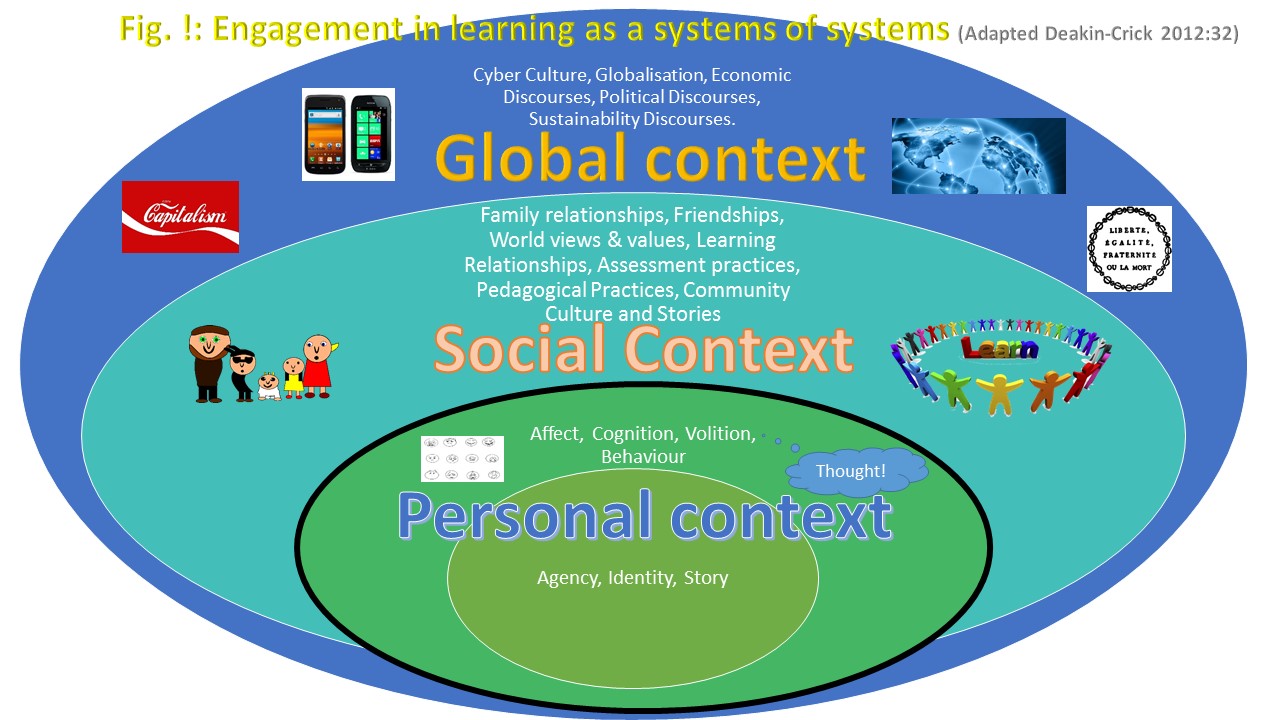
Deakin-Crick, R.E. (2012) ‘Deep Engagement as a Complex System: Identity, Learning Power and Authentic Enquiry’ in Reschly, C.S., & Wylie, C.A. (Eds.) Handbook of Research on Student Engagement New York, Springer. http://dx.doi.org/10.1007/978-1-4614-2018-7_32 (Version accessed from Bristol Unversity Open Access http://research-information.bris.ac.uk/files/7132626/Deakin_Crick_2012_Deep_Eng_as_a_complex_system.pdf (Accessed 26/07/16).
Comments
New comment
I like 'Fig. !'New comment
Hi Josie
I think I'll change the 'system of systems' and not just the typo adding an unnecessary plural - so thanks so much for the feedback. The phrase seemed meaningful to me when I took notes but now I'm unsure - I knew you could help me think, Josie.
The circles I take as being differentiated by the intrapersonal functions they represent. 'Mindful Agency' in Deakin-Crick by 2015 (in a paper with Huang, Shafi & Goldspink) becomes associated with the key main active variable in what she calls 'Learning Power'.
Agency drives the sense of self as a leading factor in the participatory shaping of context. In her 2015 paper, she sees it as a source of learning resilience through purposive planning, predictive of factors such as creativity and sense-making in the world. She describes it as on the horns of the 'free will - determinism' dilemma, so I see it as that which manufactures the sense that we can co-create our own story.
Hence, I think it serves as the core (or 'heart') of the 'Personal'. It creates 'story' and 'identity' which then operate purposefully on the outer circle of the self containing cognitive tools less dedicated to a single self-serving purpose (like volition).
Does that make sense?
Lovely to hear from you, Josie
New comment
I don't mind 'a system of systems'. I take it to mean a complex system and if you want to avoid 'complex system' for any reason then 'a system of systems' seems pretty accurateNew comment
Again you are correct. I think, Josie. For my own purposes I have changed the title as you see above because the key to the whole is I think the concept of intra-systemic interaction. Again I agree that you are correct to identify the whole as a complex system, in which case a more accurate title might have been: 'Engagement in learning as interactions' (of course there are many) between sub-systems of a complex system'. I may be too lax in allowing myself to talk about 'systems' in ways that do not differentiate their location in a nexus of systenic interactions, but I suppose that was the neauty of systems theory, even when confined to biology. Suddenly we talk about the 'nervous system' and forget its interactions with other systems (even other embodied systems). I remember feeling a 'lightbulb; moment once in studying the issue of neuronal connections around the gut, which some have identified as a 'gut-brain' (over-enthusuastically). However, it helps when we consider that serotonin activity is greater there than elsewhere and that it may be possible therefore that anti-depressants are actually treating gut-feelings.
So thanks again. You are correct about what I was trying to do with 'system of systems'.
As for agency, Deakin-Crick purposefully allows it to attach to meanings of the term in philosophical thought as well as psychology, I think. She wants it to represent a defence against any kind of exclusive philosophical determinism, whilst showing that 'agency' only exists for human beings in as much as they accept co-production with others (persons and factors) of constructs like 'myself', 'identity', story or 'autobiography'. In her latest work she cites a writer I have yet to get to know and his ‘interpersonal neurobiology’. She and colleagues quote this claim of Siegel relating to a ‘core aspect of the human mind’: “an embodied and relational process that regulates the flow of energy and information within the brain and between brains” (Siegel 2012 cited Deakin-Crick et. al. 2015:150).
Ref:
Deakin Crick, R., Huang, S., Shafi, A.A. & Goldspink, C. (2015) ‘Developing Resilient Agency in Learning: The Internal Structure of Learning Power’ in British Journal of Educational Studies 63 (2) 121 – 160. Available from: http://dx.doi.org/10.1080/00071005.2015.1006574 (Accessed 14/06/2016)
PS the original nested Venn chart derives fron a 2012 essay by the writer on Engagement - reference not to hand.